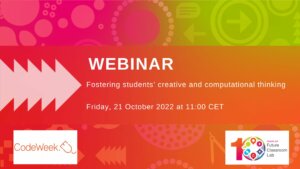Webinar: Fostering Students’ Creative and Computational Thinking

When: Friday, 21 October 2022 at 11:00 CEST
Where: Online, registration is open
Panelists:
- Panagiotis Kampylis, Senior Research Fellow at the National Research Council of Italy – Institute for Educational Technology and Policy and Data Analyst at the Greek National Documentation Centre: Insights and key findings from the report “Reviewing Computational Thinking in Compulsory Education”;
- Artur Coelho, ICT teacher at Agrupamento de Escolas Venda do Pinheiro in Portugal, member of Lab Aberto Fablab, and also a trainer at ANPRI and CFAERC: What Would Da Vinci Do? – covering Papert, digital art, and ways to implement coding and arts at an elementary school level;
- Eva Toth, teacher of English and Project Based Learning in a vocational school in Hungary: Time-travelling or landing on Mars – Cross-curricular thematic weeks with offline and online coding activities requiring problem-solving skills;
A recent study in Malta found that 99.9% of the students wanted to be taught “non-traditional” subjects such as coding and financial literacy. Two obstacles to this were identified – the lack of adapted curriculum and the lack of support for teachers and schools to implement the transition. Over the last few years much has been said and written about the upcoming digital decade, the growing reliance on tech tools, the advances in AI and robotics and the need for employees who feel confident in working with and understanding technology. There is a growing awareness that technological developments are not going to slow down and that the demand for relevant skills will only increase. It has become clear to everyone that we are headed towards a future where the ability to understand how technology works and the creativity to imagine what else it could do will be crucial.
Within the larger conversation, attention to the pivotal role of compulsory education in addressing this need has slowly started being paid. It is in these early stages of cognitive development that children begin to form their attitude towards technology. As a result, schools have the responsibility to help students build a positive relationship with it – one within which they are not just passive consumers but active participants; one within which they do not just click and scroll but have the ability think critically, create, and understand.
How we can work towards achieving that is the topic of our upcoming webinar titled “Fostering students’ creative and computational thinking”. Experts and educators are going to exchange on the potential benefits of computational thinking, ways of introducing coding education in the classroom, and how coding can foster creativity and self-expression.
It is important to note that computational thinking provides an opportunity for students to acquire many transferable skills such as problem solving, critical thinking, and creativity. The process of programming supports the development of solution-oriented mindset, collaborative skills and resilience. Above all, it encourages pupils to approach tasks with a result-oriented mindset and to design logical and structured pathways to the solution. All of these are much-needed 21-century skills.
As pupils learn how to design solution systems, analyse problems, break them down into smaller, more manageable components, discover their errors and think out of the box to find alternative models, they develop confidence in their abilities to create useful tools for the world around them.
For many of us today programming was a career option among many, but for the next generation coding skills will be necessary for the majority of professions as we begin to experience life more and more through the filter of technology.
Join us online on Friday, October 21st to learn more about the state of computational thinking across the European education ecosystem and to get inspired by ideas and examples from experts and educators that advocate for and integrate creative and computational thinking into their practice. The webinar is open to any teacher, education expert, and policymaker. You can register here to receive a reminder or join our livestream on Twitter, YouTube and Facebook on 21 October 2022 at 11:00 CET.



Schreibe einen Kommentar